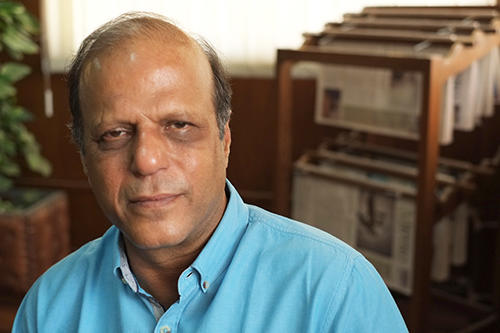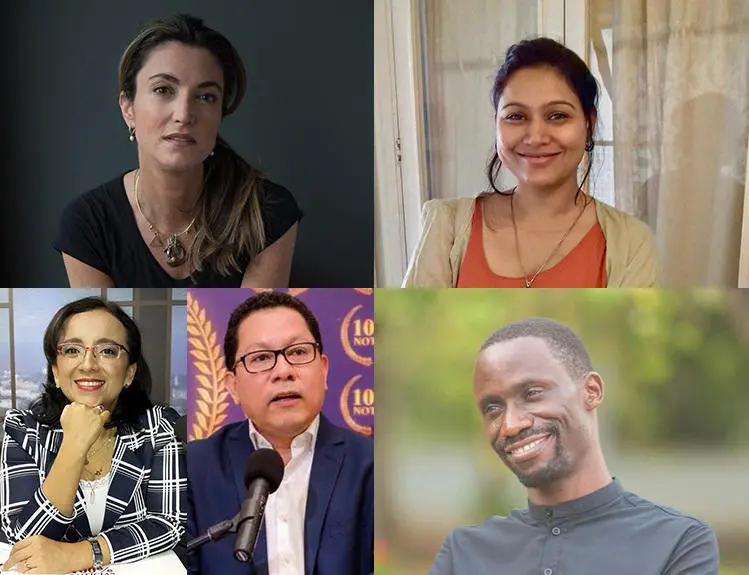CPJ is honored to present its 2019 Gwen Ifill Press Freedom Award, for extraordinary and sustained achievement in the cause of press freedom, to Pakistani editor Zaffar Abbas.

Abbas is the editor of Dawn, Pakistan’s leading daily newspaper. He has an extensive career in journalism, starting in 1981, when he worked as a junior reporter for the Karachi-based newspaper The Star. In 1988, he began working at the Herald, a prestigious Pakistani monthly magazine, as its leading investigative reporter. Four years later, he joined the BBC World Service as a Pakistan correspondent in Islamabad.
In 2006, Abbas left the BBC to join Dawn, where he reported on events including insurgency and civil war in Afghanistan during the Soviet occupation and post-9/11 policies and developments in the region, including the rise of Islamic militancy. In 2010, he was named Dawn‘s editor-in-chief.
Under Abbas’ editorship, Dawn has come under government pressure several times. In May 2018, military guards disrupted the distribution of the newspaper in many parts of the country after the paper printed an interview with the former prime minister. Those disruptions still continue in some areas. In 2016, after Dawn published an exclusive report on the relationship between the military and leaders of the then-ruling party, distribution of the paper to provinces such as Sindh and Punjab was disrupted. Abbas told CPJ that he and the reporter of the story were each interrogated by members of the intelligence service for hours, but they refused to divulge their sources.
Abbas has faced reprisals for his work in the past. In 1991, armed men attacked him and his brother at his home in Karachi after he reported on the Muttahida Qaumi Movement political party. The two were badly beaten, and he required stitches on his head. A few years later, armed extremists attacked the BBC office in Islamabad and set it on fire, and beat him and his colleague. The attack was in apparent retaliation for two films shown on the BBC that showed members of a majority Sunni sect advocating attacks on Shias.
In 2018, CPJ published a special report on Pakistan, accompanied by a documentary, that found that widespread intimidation and threats of assault have led journalists and editors to avoid reporting stories on topics that would lead them into trouble. These topics include a wide range of touchy issues: religion, Chinese investment, relations with India, militant groups, and criticism of the military. “Even discussing politics or serious conflicts can be a red line,” Abbas told CPJ last year.
Amid threats and murders of Pakistani journalists in recent years, Abbas has been a vocal supporter of industry steps for journalists to keep themselves safe. In 2015, he was elected chairman of Editors for Safety, a network of editors in Pakistan who work together to protect journalists who come under attack.
The text of Zaffar Abbas’ acceptance speech, as prepared for delivery, is below
Thank you Lester. Journalist friends, distinguished ladies and gentlemen,
As I stand here today humbled by this CPJ accolade, I look back at my career and realize that I have confronted violence and intimidation all through my working life.
As far back as 1991, when physical attacks on journalists were rare, members of a powerful ethnic militant group — armed with guns, knives and iron rods — barged into my Karachi apartment to ‘punish me.’ What was my crime? To have quoted verbatim from their leader’s speech in my report. He seemed to have made his indiscreet remarks in the mistaken belief that no journalist was present. Even my brother, Anwar, was not spared because he came to my rescue. I was hospitalized with multiple injuries including head wounds. The support from the journalistic fraternity was huge, and there were demonstrations across the country. I felt very reassured.
By 1995, I had moved to Islamabad, when members of an Islamist militant group charged into the BBC bureau, destroying our vehicles and setting a part of the office on fire. By this time, I had learnt some safety techniques such as marking an escape route. I used it. Daniel Lak, who happened to be in a different part of the bureau, wasn’t so lucky and got beaten badly.
With hindsight, I’d say even those days were not so bad. What followed and tragically continues to this day is horrific — the assassination of journalists. Government agencies and militant groups alike are complicit in this. Over the past couple of decades more than 60 have been killed in the line of duty. So far, only a handful of these cases have been properly investigated, reinforcing a chilling culture of impunity when it comes to crimes against journalists in Pakistan.
Not content even with the physical elimination of reporters, government agencies and security services are now using newer weapons including financial strangulation to silence the media. Take Dawn’s example. Dawn is viewed in Pakistan as the most credible media voice. Since the so-called Dawn Leaks three years ago, powerful state institutions have made every effort to destroy the newspaper and its credibility. There has been widespread disruption of its distribution network, all in the name of ‘national interest’ and patriotism. Our advertising, both government and private, has been targeted.
What was Dawn’s crime? Our refusal to submit to illegal demands of censorship. We kept reminding the government and its security services that harboring and nurturing Islamist militant groups for regional policy goals was a bad idea; that it would bring us grief. We reported on the specifics of policy. Ironically, now the prime minister and the military say they have zero tolerance for militancy as it harms the country. When we said as much, we were declared ‘unpatriotic,’ castigated on TV channels that are no more than surrogates of the security services. We were tarred with the same brush in sustained social media campaigns; my colleagues and I were dragged before an inquiry tribunal whose aim was to find out our sources. We refused, but Dawn was made to pay dearly for our refusal.
Pakistani state agencies use ‘national interest’ and ‘patriotism’ as the pretext to suppress free expression, and to promote their own ‘narrative’ about everything — from domestic power grabs to foreign policy to counter-terrorism. Anyone who questions this narrative is stamped anti-state, as Dawn has been.
I recognize we are not alone. When the White House questions the veracity of serious journalism, dubs it ‘fake news’ and promotes a toxic nationalistic mindset, it inspires leaders from Pakistan to India, from Bangladesh to Brazil, to curb free speech.
In Pakistan, a number of media houses have capitulated to the security services; they say they toe the line only to survive. Some even counsel me to follow suit: to live to fight another day.
I say I have spent almost 40 years trying to tell the truth. Surrender is not journalism. Telling the truth is. For me, and hopefully for many others in the profession, capitulation is not an option.
As I reflect on my professional journey that has led to this endorsement, this prestigious award, by the Committee to Protect Journalists, I must acknowledge my most significant co-travellers. First and foremost: Tasneem, my wife, my soulmate and the most formidable pillar of support through all the peaks and troughs of my career; our daughter, Paaras, and my extended family that has stood by me. I need to thank particularly the Dawn team, that I am privileged to lead, for standing tall and doing its job without flinching through financial hardship and threats; and the Dawn management for backing our editorial independence. This award is for all of us and more than that for our fallen fellow-journalists.
Words fail me as I try and convey my gratitude to the Committee to Protect Journalists: you are not just honoring me. You are adding a meaningful voice to the cause of media freedom in my country.
I thank you again.
